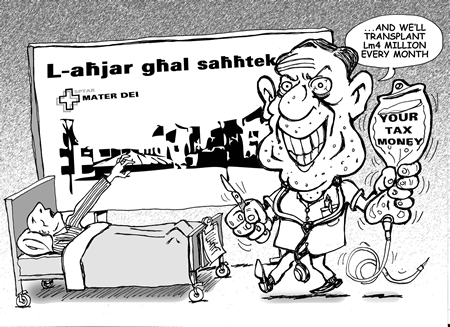
| EDITORIAL | Sunday, 11 November 2007 Let’s talk about health
Mater Dei Hospital is once again in the news, this time thanks to shadow health minister Michael Farrugia’s comments about certain medical procedures not being in place prior to an operation carried out this week by renowned cardiologist Albert Fenech.
From its inception, this hospital has been riddled with controversy and allegations regarding its spiralling costs and the delay in its completion. To the Prime Minister’s credit, on taking office he set a deadline date, in agreement with the construction company Skanska, for the handing over of the hospital. This appointment was duly kept, followed by a rather surreal opening ceremony taking place without patients, and then a very successful open day allowing people to see the hospital with their own eyes, and more importantly, with an open mind. The general perception is that Malta finally has a state of the art hospital with accolades thrown at its high level by no less than the Leader of the Opposition. Now that the hospital is slowly but surely receiving its first patients, we strongly believe that all the controversy surrounding the hospital should be given less attention and all the parties involved should engage in a battle of ideas. The debate should be all about the hospital’s sustainability, with the patient as the focal point of discussion. Mater Dei will be judged on a daily basis by patients making use of its services and not by car drivers looking at ill-thought out billboards. People’s expectations must be well managed and the authorities should not promise more than they can deliver. Extreme caution must be shown with the migration to Mater Dei taking place. This is a very sensitive period where the country can well do without the whole process being politicised. It is in this vein that we believe Michael Farrugia should have been far more discreet and less alarmist. It is crucial that all people retain their confidence in the professionalism of the medical services offered in our state hospital, which for years has been of a high calibre, especially when considering the limited resources available and more importantly its free service. Government rightly felt that in view of the brain drain, especially since EU membership, doctors’ conditions of work should be ameliorated. The administration has been careful to point out that there has been no upset to the salary scales in government service; however, the first noises are already being made by the Malta Union of Teachers asking that their conditions also be looked into. If such claims result in other salary adjustments, we can expect an inflationary spiral that will wreak havoc to government projections in the budget. Add to government costings the latest increases in the price of oil, and the targets set in the budget could all be thrown to the wind. What we would like to see, rather than a discussion resolving around leaking rooftops or non-functioning lifts – both of which, while important, are part of the teething problems of all newly functioning projects – is the political class engaging in a battle of ideas on the future of the public hospital, and indeed the national health service in its totality. There are many issues which need to be addressed. Can the country afford the running costs of such a state of the art hospital? When VAT was increased from 15% to 18%, the justification was the increase revenues would be channelled into containing the health cost. Why has this still not materialised? Can this service remain “free for all” at the point of treatment? If this is unsustainable, how do the political parties intend addressing this issue? The people are owed an explanation. At present, both sides categorically deny the imposition of charges in future. Is this realistic? Beyond all talk of money being pumped into the health sector and its running costs, we need to have concrete answers on how the waiting lists are going to be shortened – the latest agreement with doctors hopefully goes a long way to addressing this problem – and how services can become more personal with the patient being given more information on treatment and risks involved. Clear benchmarks also need to be set which can guarantee a better quality of life. And what are the future plans for St Luke’s? This battling out of ideas is the essence of political debate; this is what the political class should be engaged in. Are we asking for too much on the eve of an election? Once the service becomes personalised, then and only then should we start talking of treating patients from overseas, as an eventual revenue earner that can also help place our hospital on a sustainable footing. Any comments? If you wish your comments to be published in our Letters pages please click here |
MaltaToday News |
Copyright © MediaToday Co. Ltd, Vjal ir-Rihan, San Gwann SGN 9016, Malta, Europe
Managing editor Saviour Balzan | Tel. ++356 21382741 | Fax: ++356 21385075 | Email
Managing editor Saviour Balzan | Tel. ++356 21382741 | Fax: ++356 21385075 | Email
